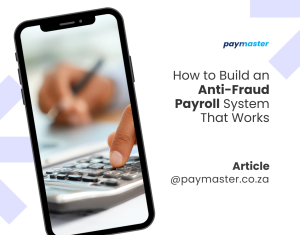What is the EMP501 and Why It’s Important
To begin with, the EMP501 is a report that every employer in South Africa must send to SARS. In simple terms, it shows all the money you took off your employees’ salaries for tax and compares it with the money you actually paid over to SARS every month.
Because of this, the EMP501 is very important. If the numbers do not match, it can cause problems for both your business and your employees. In fact, your employees need the correct information from this report to get their IRP5 tax certificates, which they use to do their own tax returns.
So, in short, the EMP501 is not just another form. Instead, it’s the key to making sure both employers and employees stay tax compliant.

The Role of IRP5s, PAYE, UIF, and SDL in the Reconciliation
When you complete the EMP501, you are basically making sure all the pieces of payroll fit together. To explain, here are the main parts:
- IRP5/IT3(a) Certificates – These are like payslips for SARS. They show how much each employee earned and how much was taken for tax, UIF, and SDL.
- PAYE (Pay-As-You-Earn) – This is the tax you deduct from salaries and pay to SARS every month.
- UIF (Unemployment Insurance Fund) – These contributions help employees if they lose their job or cannot work.
- SDL (Skills Development Levy) – This small amount helps fund training and skills development in South Africa.
As a result, if the information in these records does not balance with your monthly EMP201 forms, SARS will notice. Therefore, it is much easier to keep track of your payroll records regularly, instead of waiting until the submission is due.
Key Deadlines: Interim vs. Annual Submission Periods
Next, let’s talk about deadlines. Employers must send the EMP501 to SARS twice a year.
- Interim reconciliation (mid-year): This covers the first half of the tax year. It usually happens in October.
- Annual reconciliation (year-end): This covers the whole tax year and is due in May.
Because these deadlines are fixed, it is very important to prepare ahead of time. For example, if you miss the October deadline, the final May deadline becomes even more stressful. In addition, employees cannot get their IRP5s on time if you delay the May submission. That means they might struggle to file their own tax returns.
Therefore, keeping up with both deadlines not only helps your business but also shows your employees that you take their needs seriously.

SARS Penalties for Non-Compliance
Finally, let’s look at what happens if you do not comply. SARS does not take missed deadlines or incorrect submissions lightly. In fact, the penalties can be severe:
- Late or incomplete submissions can lead to extra admin charges.
- Unpaid PAYE, UIF, and SDL can collect interest and penalties.
- Incorrect information can trigger a full SARS audit, which is stressful and time-consuming.
As a result, non-compliance can cost your business both time and money. On top of that, it can also harm your reputation with employees, who depend on accurate IRP5s for their tax returns.
In conclusion, EMP501 compliance is not optional—it’s essential. By keeping payroll records accurate, checking them often, and submitting on time, employers can avoid penalties, save time, and give employees peace of mind.
Contact us





